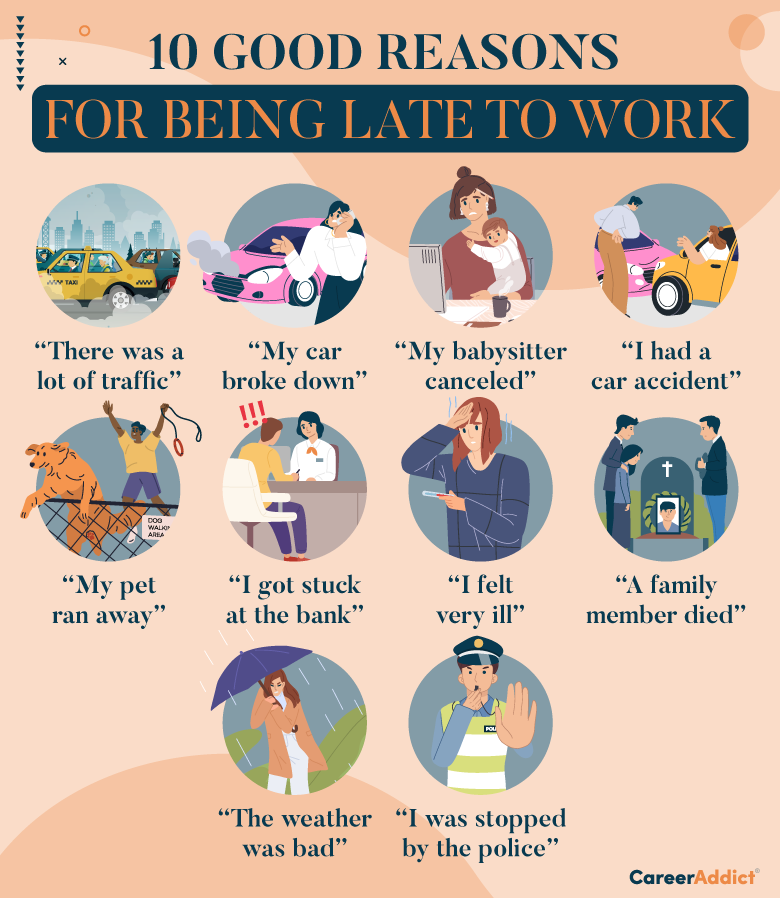Bulletproof Excuses to Get Out of Work
In today’s demanding work environment, there are times when you may need to take a break, whether due to personal matters or unexpected events. Crafting the right excuse can be challenging, but it’s essential to communicate effectively and maintain professionalism.In this guide, we’ll provide you with bulletproof excuses that are both legitimate and considerate, ranging from health issues to family emergencies. By using these well-crafted excuses, you can navigate your time off with confidence, ensuring that your responsibilities are managed while prioritizing your well-being. Let’s explore these effective strategies to help you step away from work when you need to!
Understanding the Importance of a Solid Excuse
Work-life balance is critical, but sometimes life throws unexpected situations your way. It’s essential to have a few dependable excuses ready so you can handle those moments without stress. However, while crafting an excuse, honesty should be at the core—just make sure it’s a valid reason that won’t be questioned. This approach not only keeps you in good standing with your employer but also ensures you don’t burn bridges for future requests.
The Art of Delivering an Excuse
The key to a successful excuse lies in its delivery. Be confident, concise, and clear when presenting your reason. If you seem hesitant or unsure, your employer may doubt your credibility. It’s also important to choose the right time to deliver your excuse, as well as to provide necessary details without over-explaining.
Common Bulletproof Excuses to Get Out of Work

Health-Related Reasons
Health concerns are some of the most universally accepted reasons for taking time off work. They can range from minor ailments to more serious conditions.
1. Migraine or Severe Headache
Migraines are unpredictable and can be debilitating, making them an excellent excuse. It’s difficult for others to argue against a condition they cannot see or measure.
2. Stomach Issues
A sudden bout of food poisoning or stomach flu is not only plausible but also keeps you out of work without question. Employers understand the need to recover and prevent the spread of illness.
3. Mental Health Day
More companies are recognizing the importance of mental health. Expressing the need for a mental health day is becoming increasingly accepted, especially if framed within the context of preventing burnout.
Family-Related Excuses
Family emergencies are another category of excuses that are generally well-received and understood by employers.
1. Childcare Emergencies
Whether your child is sick, the babysitter canceled last minute, or there’s a school issue that requires your attention, family responsibilities are hard to dispute.
2. Elderly Parent or Family Member Needs
Taking care of an aging parent or a family member in crisis is a common and acceptable reason for missing work. It’s personal and typically garners empathy from your employer.
3. Family Emergency
Vague but effective, a “family emergency” can cover a broad spectrum of situations. The key is to keep details minimal to avoid unnecessary questions.
Excuses That Require a Bit More Detail
Home-Related Issues
Sometimes, home maintenance problems demand immediate attention, and employers often understand these situations.
1. Burst Pipe or Plumbing Issues
A burst pipe or significant plumbing problem requires immediate resolution, as it can cause extensive damage if not addressed. This excuse works well as it’s both urgent and believable.
2. Electrical Problems
A power outage or electrical fault in your home is another solid excuse. The safety concerns associated with electrical problems make it a priority that few employers would question.
3. Home Security Issue
If there’s a security concern at your home, such as a break-in or an alarm going off, most employers will understand the need for you to be present to secure your home and deal with the aftermath.
Transportation Woes
While transportation excuses need to be used sparingly, they can be very effective when genuine.
1. Car Trouble
Car trouble is a classic excuse. Whether it’s a flat tire, engine trouble, or your car breaking down on the way to work, it’s difficult for employers to argue against unforeseen vehicle issues.
2. Public Transport Delay
If you rely on public transportation, delays can sometimes make getting to work impossible. Informing your employer about a significant disruption in your commute is a valid reason to miss work, especially if you’re far from the office.
3. Accident or Road Closure
In the event of an accident or major road closure, you can explain that traffic is at a standstill and you’re unable to reach work. It’s crucial to convey that this situation is out of your control.
How to Make Your Excuse Bulletproof
Timing Is Everything
The success of an excuse often depends on when and how it is delivered. Try to inform your employer as early as possible, giving them enough time to make arrangements. Last-minute notifications can raise suspicion, so if possible, plan ahead.
Stick to the Truth, With a Twist
While it’s important to be honest, sometimes you may need to adjust the details slightly to ensure your excuse is bulletproof. For example, if you’re feeling mentally drained, you might explain it as needing a day to prevent burnout, rather than detailing your exact mental state.
Avoid Overusing Excuses
Using the same excuse repeatedly can raise red flags. It’s essential to rotate your reasons and not rely on one too heavily. Variety keeps your excuses credible and minimizes the risk of doubt.
Bulletproof Excuses: Ethical Considerations
The Ethics of Lying to Get Out of Work
While the focus here is on creating bulletproof excuses, it’s important to consider the ethical implications. Repeatedly lying to get out of work can lead to a breakdown in trust and might jeopardize your job in the long run. It’s crucial to balance your need for time off with honesty and integrity.
When It’s Necessary to Be Transparent
Sometimes, it’s better to be upfront with your employer. If you’re facing ongoing issues, such as a chronic illness or family problems, transparency can lead to better support and understanding from your workplace. They may offer flexible working arrangements or additional leave to accommodate your situation.
Less Common but Effective Excuses
Legal Obligations
Legal reasons are difficult to dispute and usually require your immediate attention.
1. Jury Duty
Serving on a jury is a legal obligation that employers cannot refuse. Once summoned, it’s an easy way to secure time off work.
2. Court Appearance
If you’re required to appear in court for any reason, your employer will likely understand. Just be sure to provide necessary documentation if requested.
3. Legal Meeting or Deposition
Being involved in legal proceedings, such as a deposition, can also serve as a valid excuse. Given the formal nature of these obligations, they’re hard for employers to question.
Uncommon Yet Believable Excuses
For those rare occasions when you need a unique excuse, consider these less conventional but believable reasons.
1. Pet Emergency
Pets are family members too, and if your pet has a medical emergency, it’s a legitimate reason to miss work. Most employers will sympathize with your situation.
2. Unforeseen Religious Obligation
Religious obligations can sometimes arise unexpectedly. Whether it’s a special service, ceremony, or observance, many workplaces will respect your need to participate.
3. Community Service Commitment
If you’re involved in community service or volunteering, an urgent commitment can be an excuse to miss work. Be sure to explain how your absence contributes to the greater good.
Conclusion
Crafting bulletproof excuses to get out of work is both an art and a science. It requires a balance of honesty, timing, and variety. While it’s essential to have reliable reasons at your disposal, using them responsibly is just as important. Remember, maintaining a good relationship with your employer and preserving your integrity will serve you well in the long run. So, the next time you need to miss work, choose your excuse wisely, deliver it confidently, and ensure it’s one that aligns with your personal and professional values.
Also Read: Short Prayers for a Peaceful Death: Comfort for the Final Journey
Frequently Asked Questions
What are the best last-minute excuses to get out of work?
Last-minute excuses that are hard to dispute include sudden illness (like a migraine or food poisoning), a family emergency, or a home-related issue like a burst pipe or electrical problem.
Can I use the same excuse more than once?
While it’s possible to use the same excuse more than once, it’s better to vary your reasons to avoid raising suspicion. Repeating the same excuse frequently can make it less believable.
Is it okay to lie to get out of work?
Lying to get out of work should be approached with caution. While occasional white lies might be harmless, habitual dishonesty can damage your reputation and trust with your employer.
How should I inform my employer about needing time off?
It’s best to inform your employer as early as possible, providing a brief but clear explanation. Use a method that is appropriate for your workplace, whether it’s a phone call, email, or text message.
What if my boss doesn’t believe my excuse?
If your boss questions your excuse, stay calm and stick to your story. Providing any necessary documentation, like a doctor’s note, can help validate your claim.
Can I be fired for using an excuse to get out of work?
While it’s unlikely you’d be fired for using an excuse, repeated or clearly dishonest excuses could lead to disciplinary action or job termination. It’s important to use excuses sparingly and ethically.








